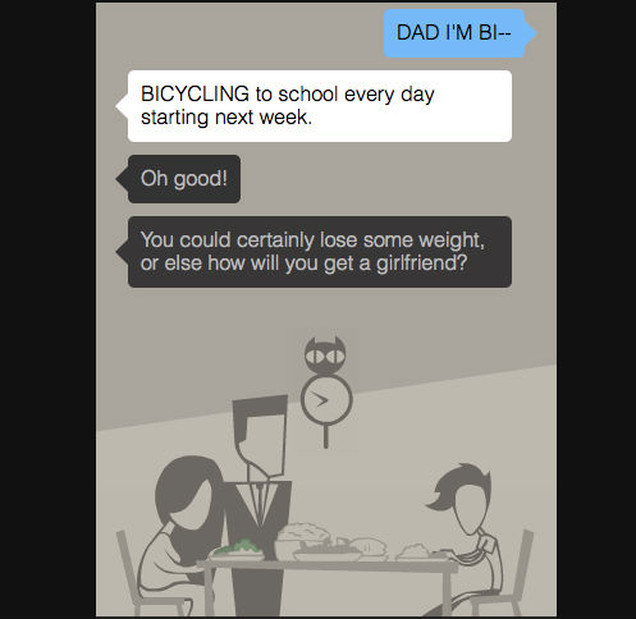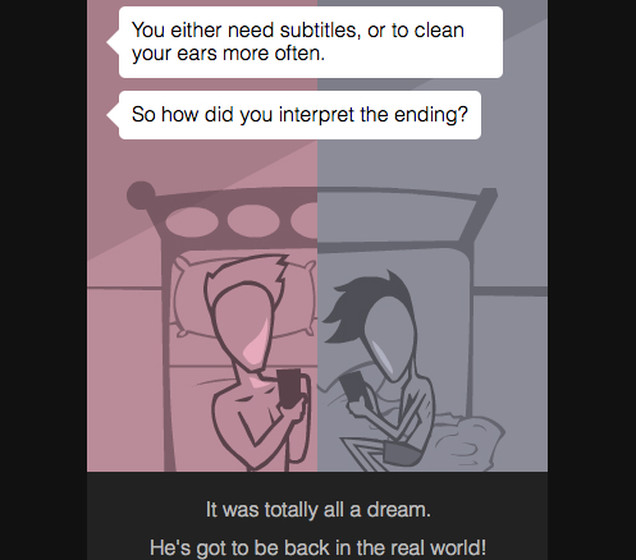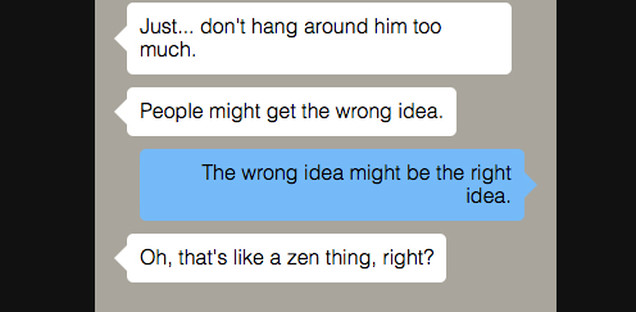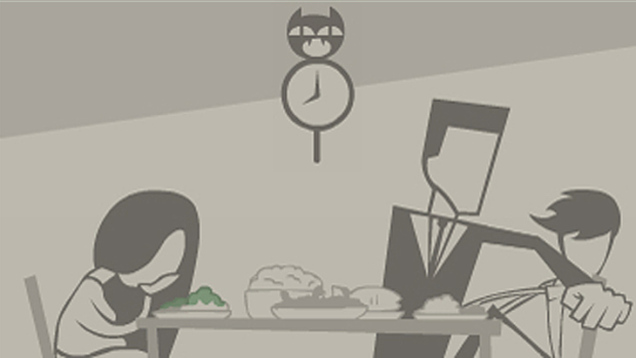“I don’t mean to sound gay here, but…” “You did what? You bought her flowers? That’s a bit bent, mate.” “He’s pure under the thumb now, man. Since he started going out with her he’s become a bit of a poof.” — All things I’ve heard many times from heterosexual men, aimed at other heterosexual men.
Could you imagine hearing these throwaway but nonetheless hurtful comments around you on a daily basis if you’re actually homosexual? Or battling the dilemma of coming out into a world where even being nice, or heartfelt, or romantic is considered to be, well, a bit ‘gay’?
Perhaps you live this already. Perhaps not, but I bet you’re familiar with flippant comments. It’s unfortunately no secret that the words gay, bent and queer are commonly used disparagingly in this country, certainly where I grew up. Even if they’re not intended as homophobic slurs, that’s what they are.
Being white, straight and male aligns me with the majority, and I’ll admit that I’ve not always been the most sensitive to how the world might be for others. Coming out is a concept I’ve never been familiar with, because I’ve never had to be. But one game changed that, and helped cement my rejection of the casual homophobia among which I grew up.
“One main goal was to let the player personally weigh the pros and cons of coming out,” says indie developer Nicky Case of his browser-based game, Coming Out Simulator 2014. Designed for the Nar8 game jam in June of last year, Coming Out Simulator 2014 explores part-fictional, part-autobiographical scenarios in which the protagonist attempts to disclose his sexual orientation to his very conservative parents. While the jam had no strict theme but to tell a story, participants were advised that “stepping outside your comfort zone” was “heavily suggested.”

So Case, inspired by his own experience, set about designing COS2014, a game about the intricacies and difficulties of coming out as gay. COS2014 went on win the jam. “That’s a main lesson I hoped to get across: that it’s totally OK to wait to come out,” Case explains. “It seemed to me like coming out was this big ‘rite of passage’ that queer teens are supposed to do. I think one of the biggest problems in coming out in this day and age, despite the obvious anti-queer attitudes of many people, is that we are absolutely rubbish at talking about whether or not to come out, tactics on coming out, and how to maintain your privacy.”
COS2014 introduces Case’s philosophy delicately at first. Via a list of dialogue prompts, players can choose how they wish to broach the subject: either gingerly, matching the parents’ less than subtle reprehension; or by coming out in vociferous defiance, rebelling against the traditionalist parental mindset.
I won’t spoil the plot, but I’ll admit that I identified with the parents’ mentality at first — largely thanks to the surroundings in which I was brought up. I live in Glasgow, Scotland, and for years I worked as a plumber and gasfitter in a very traditionalist and at times grossly narrow-minded environment where the LGBT community wasn’t exactly well-represented. Although Glasgow actually enjoys a thriving gay scene compared to other areas of the country, religion is a central tenet of day-to-day life in Scotland’s largest city, and so it’s perhaps of little surprise that homophobia is pretty rife in certain circles.
I like to think that I’m a fairly rational individual, and so before I played Coming Out Simulator I felt like I could appreciate the personal and social challenges that coming out must present. But COS2014 allowed me to really understand it — at least as much as I could from a heterosexual standpoint. The way in which COS2014 reveals the protagonist’s innermost feelings and emotions by placing you in his shoes put me in a far better position to empathise with the scenario.

“An amazing thing I learnt from my fanmail: eventually, we all face the decision of whether or not to come out about something,” explains Case. “Some of the most emotional letters I’ve gotten have been from heterosexual players coming out to their friends and family about something invisible: they’re dating a Muslim; he’s an internet sex worker; she’s hiding her schizophrenia from her friends. Those are just the big things.”
“There’s little things, too — kinks, unconventional beliefs, an embarrassing hobby. We all have something personal that we will decide, or have already decided, whether or not to risk telling others about, and to whom, and when. So, it seems that coming out is a universal experience! It’s very easy to relate. It just varies in topic and scale.”
Highlighting the universal relevance of coming out helped me understand the magnitude of the process. Traditionalist attitudes exist all of the world — Case speaks of his Singaporean heritage as a culture which generally struggles to accept homosexuality — but by relating the scenarios to our own lives, or at the very least being shown how these situations can and do play out, we become better able to comprehend their gravity.
Case also talks about his personal struggles in overcoming his own internalised homophobia, and the shame surrounding it. It’s simple for me to just think of everyone who genuinely hates gay people as a bigoted dick, but there are people out there who feel entirely justified about it. I ask Chase what he thinks might change that.

“As for improving people’s perceptions of LGBTQ folk, I think art really is the best way to go,” he says. “I know that sounds super-fluffy [but] while education and science can help at the logical level, only art can reach us at the emotional level.”
“Take for example, the television show Will & Grace. Joe Biden once said that Will and Grace ‘probably did more to educate the American public on LGBT issues than almost anything anybody has ever done so far.’ Art can help reduce feelings of disgust by normalising it; or increase feelings of disgust by making it seem alien and other. Again, evoking/removing disgust can be either good or bad.”
Coming Out Simulator 2014 works on so many levels. It presents easily relatable scenarios to those who’ve already been through coming out; it can offer advice to those who are waiting and wanting to come out; it can serve to educate those who may be ignorant about the finer concerns of the process, like I was. Given the game’s simple text-based interface, it’s quite amazing how persuasive it is in its execution. Being forced into an unfamiliar situation by Coming Out Simulator left me feeling enlightened.
“Most media is a monologue,” adds Case. “Games can be a dialogue.”
Play Coming Out Simulator 2014 for free here.


Comments
15 responses to “How One Game Helped Me Reject Homophobia”
Well it was fun watching myself get punched in the face. But it was totally worth it.
I remember playing this a while ago, very powerful stuff, the kind of game that is absolutely art.
when I was 15, I told my parents I was gay which prompted them to yell and be violent towards me for a few days until they calmed down, that was ok at least.
unfortunately I told who I thought was my best friend at the time to which he stopped talking to me and started making fun of me, he told the whole school (or at least the surrounding year levels) about me and everyday I was bullied constantly, for some reason the school said it was a police issue and the police said it was a school issue. eventually I had to move schools and keep it a secret there. I’m 20 now and feel good, I have to go to therapy but honestly the worst is past =) and I at least feel I’ve learned from it and I know they were just responding to what they didn’t understand. either way it’s good to know this exists and can help people understand or relate to. if you read this then thank you =) have a great day everyone.
A guy in my class came out at school, unlike yourself he had little resistance as his family, particularly his older brother was fully supportive of him. Oh and his brother was the school bully and local tough guy bogan.
It was not too long ago that interracial relationships were thought to be “wrong”. While there are still people out there that hold this belief but on the whole its just another relationship to society.
Though we are not there yet with attitudes to LBGT people I do think it will be in your lifetime that you will see attitudes change and people wont need to go through what you did anymore. It doesn’t change what you went through and it wont stop what you will go through but at least you can find some solace that it will change and you will most likely get to see that.
Bloody hell, that’s rough. My brother came out when he was maybe a year or two older than you were, and everyone at school was cool with it and the parents asked some questions and were a little surprised, but otherwise just factored it in as new information.
And that was around fifteen years ago, not five.
I thought discrimination after coming out was something that we’d moved AWAY from, not toward.
As a teacher, I’ve seen this occasionally and was shocked to find that when I started my first day at a school known for helping underachieving students reach employment and higher ed that there was such a large portion of the student body that was gay. Despite this, they were still full-on bullied by other students and could definitely see how a combination of their home life and school life seriously affected their motivation for the future when so many teachers would dismiss them as “lazy”. Still happens all the time today and it’s amazing how many people are simply dismissed as “lazy” or “rough” when they’ve simply being fucked over a million times and need a bit of empathy to move forward. Even with everyone hurling insults at them at an attempt to instill them with, what… motivation? Sorry you had to go through that but hopefully it’s good to hear that more and more people are making this a priority for them.
Many people sadly will stop being friends wih someone who comes out. My brother in law did his, but my wife & I still talk to the friend many years later.
It doesn’t bother me, however how well you treat others – especially those who you disagree with or do something you disagree with – is what I think is most important.
Playing mmo’s helped me come out. Theres a huge community of gay gamers online and you find each other eventually. Some people think that games like these are pure political nonsense killing the fun of games. But gay people are real, they aren’t an imaginary theme used to push an idea.
I read the comments on the US version of this article and wanted to cry.
Thank you fellow Australian Kotaku-ers. You help make KotakuAU a great place to visit everyday.
I’ve said it before, never visit the US site. It’s an anathema to intelligent, rational thought.
You’ll always find love and affection here (gives imaginary hug). 🙂
It’s funny, because there are so many homophobic people out there, but in my opinion, as a heterosexual male, is that homosexuals are actually the most interesting people, out of everyone I have ever met.
I don’t get why people are homophobic. It’s not hurting them. I went to school with people that were gay and no one cared and that’s how it should be. They were just another student like everyone else. They weren’t treated any differently, no one made fun of them. Anyone that does has some serious problems.
I just don’t understand people sometimes.
I have never heard the word ‘bent’ used like that and had no idea it was a reference to gays. I assumed it was short for ‘bent out of shape’ or something.
Is that a word that is used in Australia?